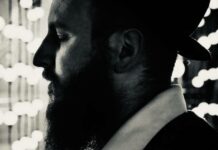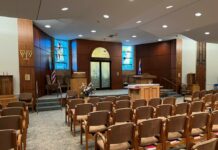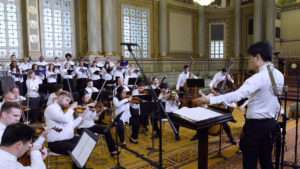
Considering that Reform Congregation Keneseth Israel’s 1856 constitution announces that “our services will be uplifted with an organ and a well trained choir,” it’s not surprising that music has played a key role in the synagogue’s 174-year history.
And music once again is front and center at 7 p.m. on June 2 when the Elkins Park-based synagogue presents a free virtual performance of “To Bigotry No Sanction,” which was previously recorded. The cantata, which was first performed by KI in 2017, is based on President George Washington’s Aug. 21, 1790 letter to the Jews of Newport, Rhode Island. The letter is on display at times at the National Museum of American Jewish History.
The letter was Washington’s response to a letter Hebrew Congregation of Newport leader Moses Seixas sent him shortly after his inauguration.
The piece’s name is drawn from a famous line from Washington’s letter: “ … the Government of the United States, which gives to bigotry no sanction, to persecution no assistance … ”
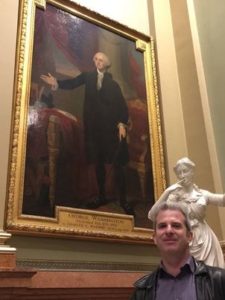
For Cantor Jonathan Comisar, who composed “To Bigotry No Sanction,” Washington’s message is timely, especially in era of increasing antisemitism and general intolerance.
“When I started this project, the letter was still ensconced in history,” he said. “As events unfolded in 2017 and through the last four years, it’s no longer ensconced in history. … The letter’s message speaks loudly and compellingly right now.”
New York-based Comisar, who teaches arranging and composition at Hebrew Union College, said the cantata includes both Jewish and American elements in the piece, such as fife and drum, which are commonly associated with the American Revolution.
The production features a multicultural choir and Philadelphia Orchestra members. Kensho Watanabe, the orchestra’s former assistant conductor, served as conductor.
In addition to Hebrew, 17 languages are included in the production — and that total of 18 is no accident, as it represents the spiritually important chai.
“There’s a moment where all the languages are in a counterpoint of cacophony,” he said, calling it the production’s most beautiful moment.
Comisar also took care with the last words of the piece, noting that the final impression is important. Those final words, taken from a phrase buried in Washington’s letter, are “if we have wisdom.”
“Those are the words that both haunt and give me hope,” he said. “That is the great question of the day.”
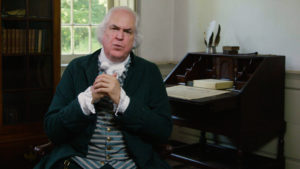
The program features an introduction by George Washington himself — as played by Dean Malissa of Huntingdon Valley, an historical interpretive actor, who recently retired after nearly two decades of playing the nation’s first president at Mount Vernon in Virginia.
Malissa, 68, is intimately familiar with Washington’s vast trove of written material and includes the 1790 letter among the first president’s most important.
“On the issue of religious freedom, this ranks No. 1. There’s no clearer statement by Washington,” he said, pointing to its significance today. “If you read the words, you would think the ink is still wet.”
Malissa, who is Jewish and grew up attending KI, said the cantata hits the mark in recognizing the importance of the letter.
“I was particularly impressed by its ability to capture the enlightenment of our founders, especially Washington,” he said.
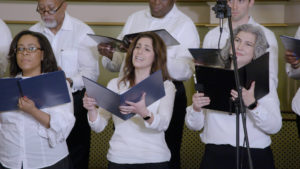
KI Cantor Amy E. Levy, who originally commissioned the cantata from Comisar — a friend and former classmate — and performs a solo, is hopeful that those who view the performance will take away more than just beautiful music.
“We hope this enlightens people and opens their minds,” she said.
After the event, Comisar and KI Rabbi Lance Sussman will engage in a conversation moderated by filmmaker Sam Katz of History Making Productions, who shot the original performance in 2018 at the Masonic Temple in Philadelphia.
More than 30 Jewish organizations in the Philadelphia area and beyond have signed on as partners for the event.
The performance is available on Vimeo at bit.ly/ki-tbns. l
[email protected]; 215-832-0797



